BMP4002 Business Law: Examining the Foundations of the UK Legal System
VerifiedAdded on 2023/06/07
|9
|2384
|155
Report
AI Summary
This report provides a comprehensive overview of the UK legal system as it pertains to business law. It begins by classifying laws within the English legal system, distinguishing between civil and criminal law and explaining the roles of the High Court and Supreme Court. The report then examines the sources of law, including case law and legislation, with a discussion of delegated legislation. Finally, it delves into the UK law-making process, focusing on employment law, statutory duties of employers, and actions related to wrongful and unfair dismissal. The report concludes that business law is a crucial element of the UK legal system derived from common law which helps in regulating the business activities, providing a framework for maintaining order, resolving disputes, and protecting the rights and liberties of businesses and customers alike. This report is available on Desklib, a platform offering study tools for students.
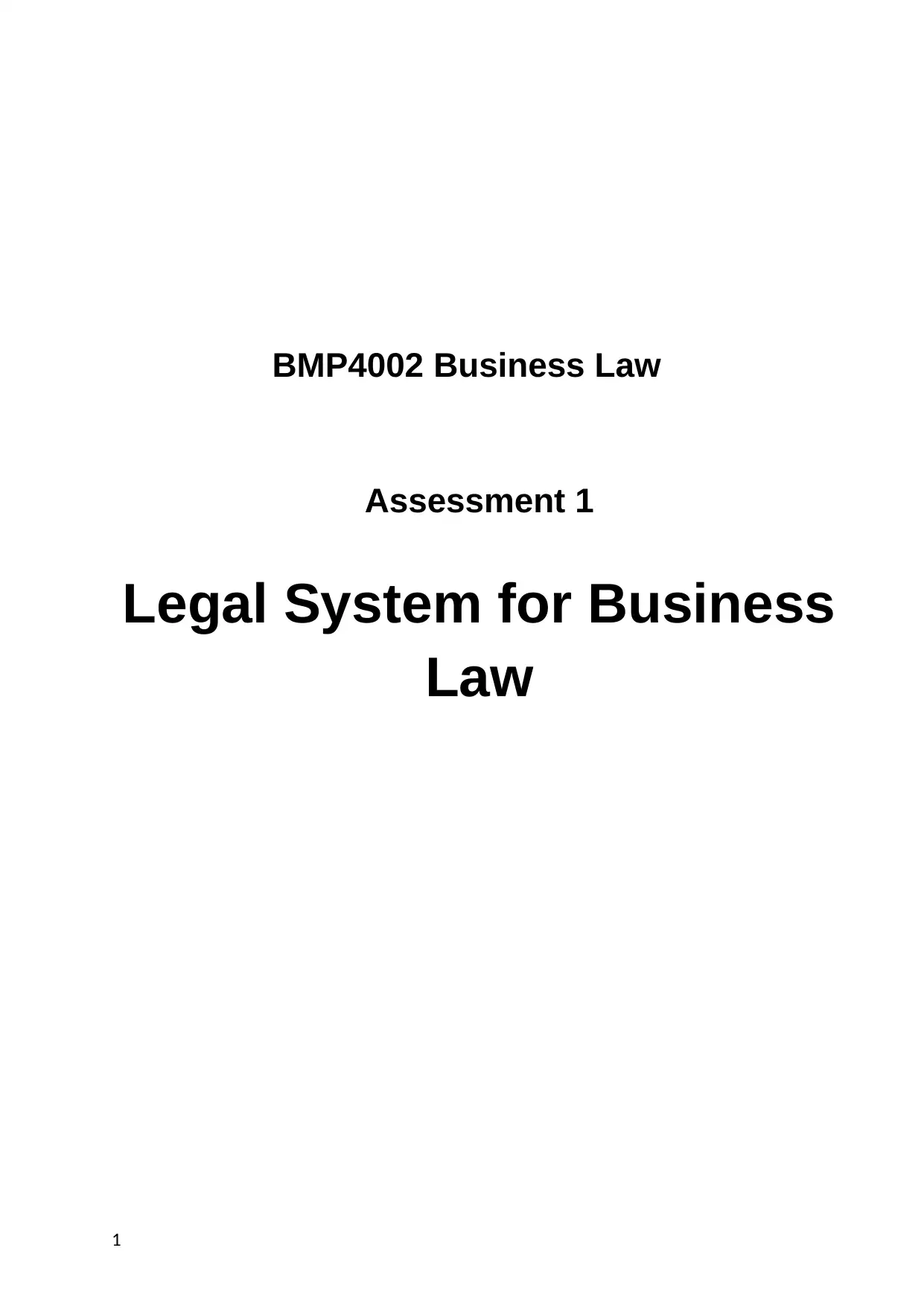
BMP4002 Business Law
Assessment 1
Legal System for Business
Law
1
Assessment 1
Legal System for Business
Law
1
Paraphrase This Document
Need a fresh take? Get an instant paraphrase of this document with our AI Paraphraser
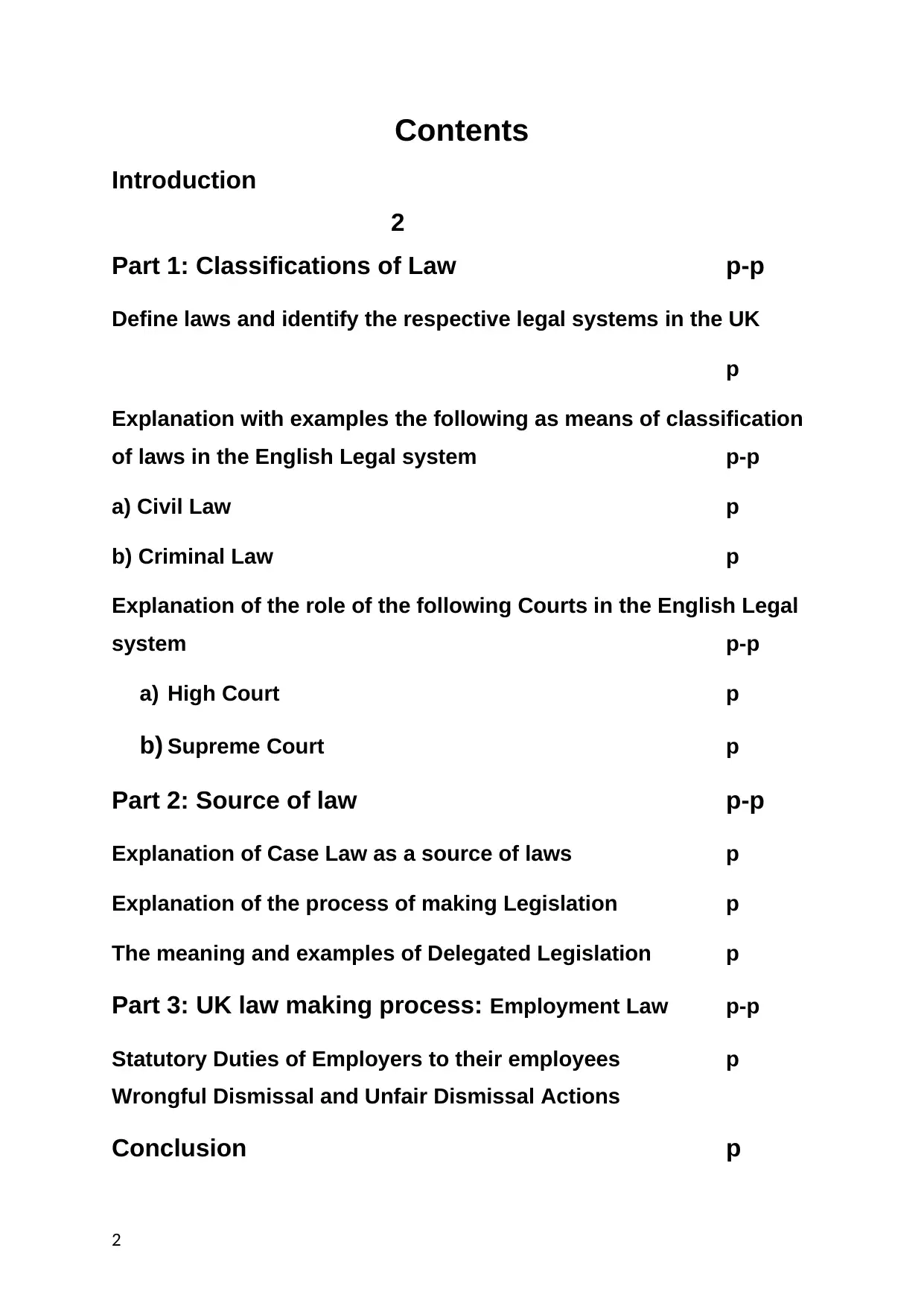
Contents
Introduction
2
Part 1: Classifications of Law p-p
Define laws and identify the respective legal systems in the UK
p
Explanation with examples the following as means of classification
of laws in the English Legal system p-p
a) Civil Law p
b) Criminal Law p
Explanation of the role of the following Courts in the English Legal
system p-p
a) High Court p
b) Supreme Court p
Part 2: Source of law p-p
Explanation of Case Law as a source of laws p
Explanation of the process of making Legislation p
The meaning and examples of Delegated Legislation p
Part 3: UK law making process: Employment Law p-p
Statutory Duties of Employers to their employees p
Wrongful Dismissal and Unfair Dismissal Actions
Conclusion p
2
Introduction
2
Part 1: Classifications of Law p-p
Define laws and identify the respective legal systems in the UK
p
Explanation with examples the following as means of classification
of laws in the English Legal system p-p
a) Civil Law p
b) Criminal Law p
Explanation of the role of the following Courts in the English Legal
system p-p
a) High Court p
b) Supreme Court p
Part 2: Source of law p-p
Explanation of Case Law as a source of laws p
Explanation of the process of making Legislation p
The meaning and examples of Delegated Legislation p
Part 3: UK law making process: Employment Law p-p
Statutory Duties of Employers to their employees p
Wrongful Dismissal and Unfair Dismissal Actions
Conclusion p
2

3
⊘ This is a preview!⊘
Do you want full access?
Subscribe today to unlock all pages.

Trusted by 1+ million students worldwide
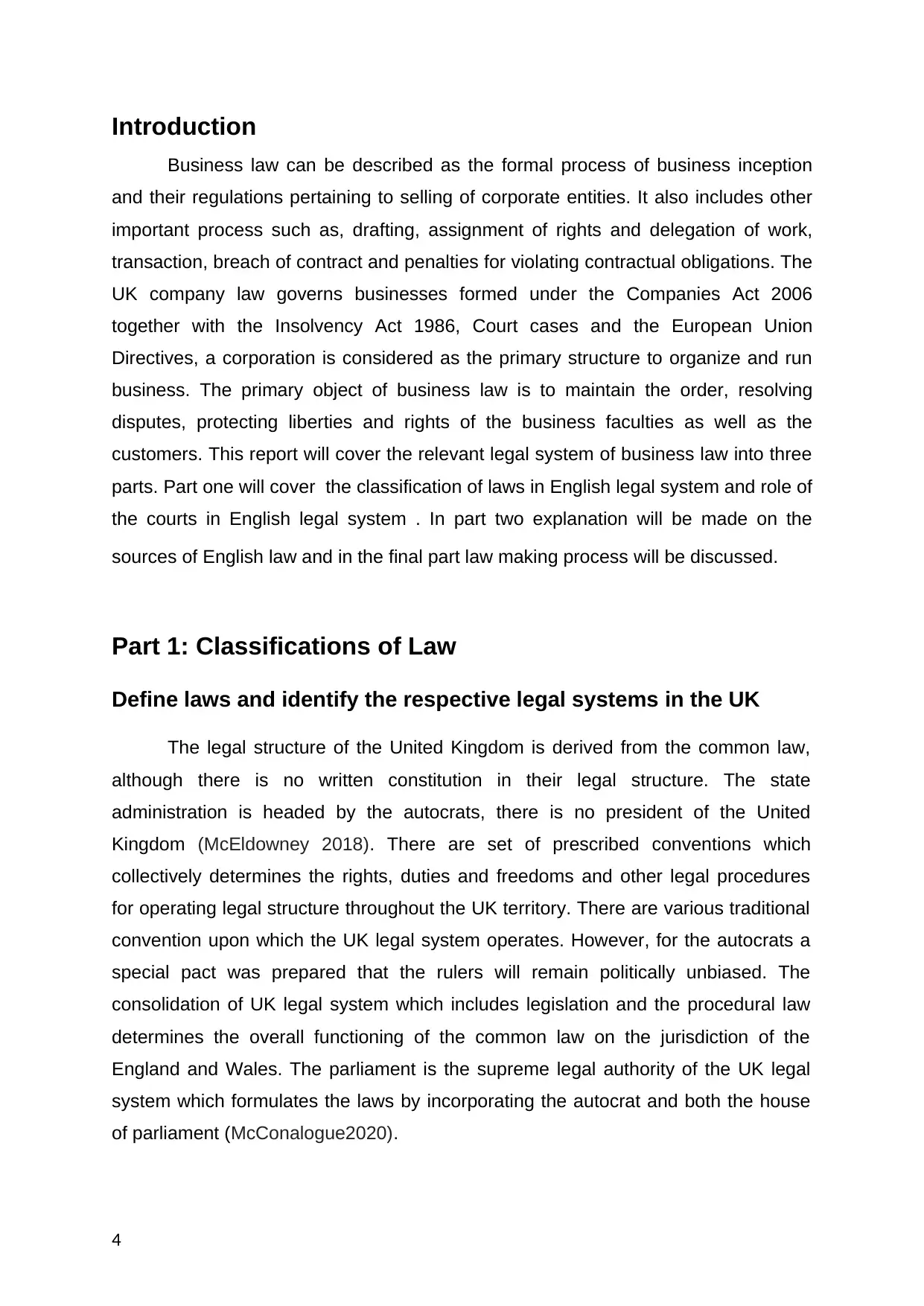
Introduction
Business law can be described as the formal process of business inception
and their regulations pertaining to selling of corporate entities. It also includes other
important process such as, drafting, assignment of rights and delegation of work,
transaction, breach of contract and penalties for violating contractual obligations. The
UK company law governs businesses formed under the Companies Act 2006
together with the Insolvency Act 1986, Court cases and the European Union
Directives, a corporation is considered as the primary structure to organize and run
business. The primary object of business law is to maintain the order, resolving
disputes, protecting liberties and rights of the business faculties as well as the
customers. This report will cover the relevant legal system of business law into three
parts. Part one will cover the classification of laws in English legal system and role of
the courts in English legal system . In part two explanation will be made on the
sources of English law and in the final part law making process will be discussed.
Part 1: Classifications of Law
Define laws and identify the respective legal systems in the UK
The legal structure of the United Kingdom is derived from the common law,
although there is no written constitution in their legal structure. The state
administration is headed by the autocrats, there is no president of the United
Kingdom (McEldowney 2018). There are set of prescribed conventions which
collectively determines the rights, duties and freedoms and other legal procedures
for operating legal structure throughout the UK territory. There are various traditional
convention upon which the UK legal system operates. However, for the autocrats a
special pact was prepared that the rulers will remain politically unbiased. The
consolidation of UK legal system which includes legislation and the procedural law
determines the overall functioning of the common law on the jurisdiction of the
England and Wales. The parliament is the supreme legal authority of the UK legal
system which formulates the laws by incorporating the autocrat and both the house
of parliament (McConalogue2020).
4
Business law can be described as the formal process of business inception
and their regulations pertaining to selling of corporate entities. It also includes other
important process such as, drafting, assignment of rights and delegation of work,
transaction, breach of contract and penalties for violating contractual obligations. The
UK company law governs businesses formed under the Companies Act 2006
together with the Insolvency Act 1986, Court cases and the European Union
Directives, a corporation is considered as the primary structure to organize and run
business. The primary object of business law is to maintain the order, resolving
disputes, protecting liberties and rights of the business faculties as well as the
customers. This report will cover the relevant legal system of business law into three
parts. Part one will cover the classification of laws in English legal system and role of
the courts in English legal system . In part two explanation will be made on the
sources of English law and in the final part law making process will be discussed.
Part 1: Classifications of Law
Define laws and identify the respective legal systems in the UK
The legal structure of the United Kingdom is derived from the common law,
although there is no written constitution in their legal structure. The state
administration is headed by the autocrats, there is no president of the United
Kingdom (McEldowney 2018). There are set of prescribed conventions which
collectively determines the rights, duties and freedoms and other legal procedures
for operating legal structure throughout the UK territory. There are various traditional
convention upon which the UK legal system operates. However, for the autocrats a
special pact was prepared that the rulers will remain politically unbiased. The
consolidation of UK legal system which includes legislation and the procedural law
determines the overall functioning of the common law on the jurisdiction of the
England and Wales. The parliament is the supreme legal authority of the UK legal
system which formulates the laws by incorporating the autocrat and both the house
of parliament (McConalogue2020).
4
Paraphrase This Document
Need a fresh take? Get an instant paraphrase of this document with our AI Paraphraser
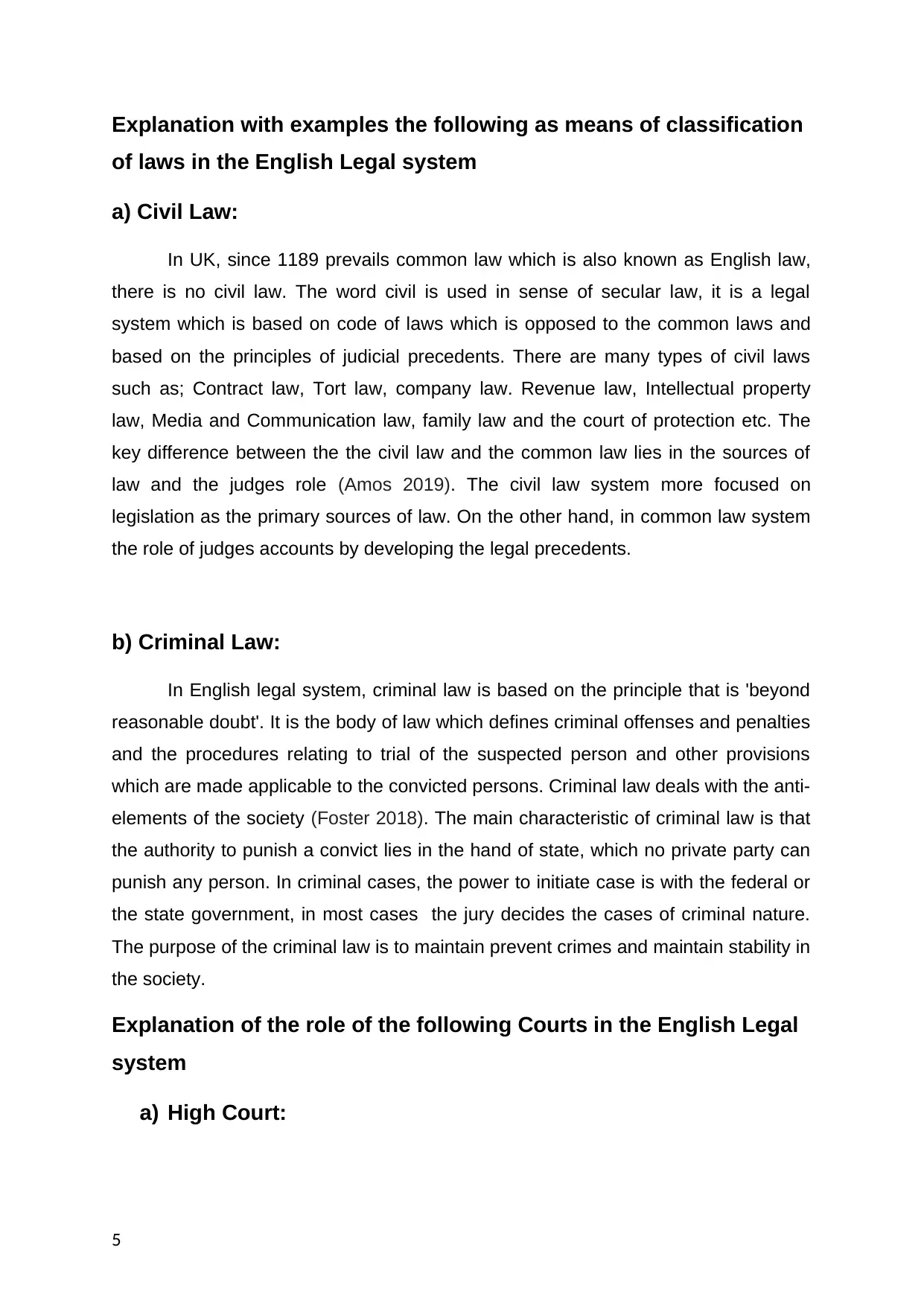
Explanation with examples the following as means of classification
of laws in the English Legal system
a) Civil Law:
In UK, since 1189 prevails common law which is also known as English law,
there is no civil law. The word civil is used in sense of secular law, it is a legal
system which is based on code of laws which is opposed to the common laws and
based on the principles of judicial precedents. There are many types of civil laws
such as; Contract law, Tort law, company law. Revenue law, Intellectual property
law, Media and Communication law, family law and the court of protection etc. The
key difference between the the civil law and the common law lies in the sources of
law and the judges role (Amos 2019). The civil law system more focused on
legislation as the primary sources of law. On the other hand, in common law system
the role of judges accounts by developing the legal precedents.
b) Criminal Law:
In English legal system, criminal law is based on the principle that is 'beyond
reasonable doubt'. It is the body of law which defines criminal offenses and penalties
and the procedures relating to trial of the suspected person and other provisions
which are made applicable to the convicted persons. Criminal law deals with the anti-
elements of the society (Foster 2018). The main characteristic of criminal law is that
the authority to punish a convict lies in the hand of state, which no private party can
punish any person. In criminal cases, the power to initiate case is with the federal or
the state government, in most cases the jury decides the cases of criminal nature.
The purpose of the criminal law is to maintain prevent crimes and maintain stability in
the society.
Explanation of the role of the following Courts in the English Legal
system
a) High Court:
5
of laws in the English Legal system
a) Civil Law:
In UK, since 1189 prevails common law which is also known as English law,
there is no civil law. The word civil is used in sense of secular law, it is a legal
system which is based on code of laws which is opposed to the common laws and
based on the principles of judicial precedents. There are many types of civil laws
such as; Contract law, Tort law, company law. Revenue law, Intellectual property
law, Media and Communication law, family law and the court of protection etc. The
key difference between the the civil law and the common law lies in the sources of
law and the judges role (Amos 2019). The civil law system more focused on
legislation as the primary sources of law. On the other hand, in common law system
the role of judges accounts by developing the legal precedents.
b) Criminal Law:
In English legal system, criminal law is based on the principle that is 'beyond
reasonable doubt'. It is the body of law which defines criminal offenses and penalties
and the procedures relating to trial of the suspected person and other provisions
which are made applicable to the convicted persons. Criminal law deals with the anti-
elements of the society (Foster 2018). The main characteristic of criminal law is that
the authority to punish a convict lies in the hand of state, which no private party can
punish any person. In criminal cases, the power to initiate case is with the federal or
the state government, in most cases the jury decides the cases of criminal nature.
The purpose of the criminal law is to maintain prevent crimes and maintain stability in
the society.
Explanation of the role of the following Courts in the English Legal
system
a) High Court:
5
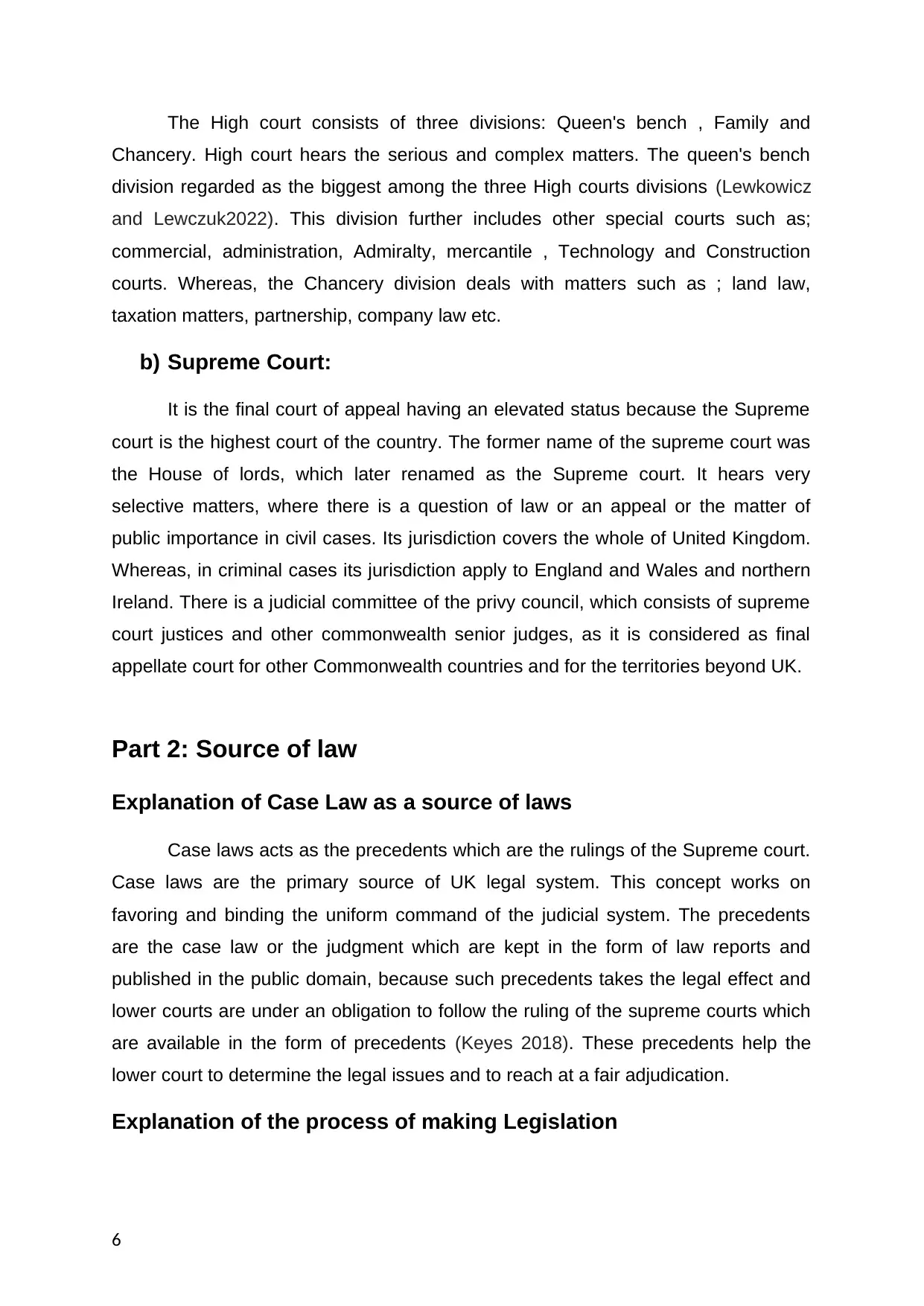
The High court consists of three divisions: Queen's bench , Family and
Chancery. High court hears the serious and complex matters. The queen's bench
division regarded as the biggest among the three High courts divisions (Lewkowicz
and Lewczuk2022). This division further includes other special courts such as;
commercial, administration, Admiralty, mercantile , Technology and Construction
courts. Whereas, the Chancery division deals with matters such as ; land law,
taxation matters, partnership, company law etc.
b) Supreme Court:
It is the final court of appeal having an elevated status because the Supreme
court is the highest court of the country. The former name of the supreme court was
the House of lords, which later renamed as the Supreme court. It hears very
selective matters, where there is a question of law or an appeal or the matter of
public importance in civil cases. Its jurisdiction covers the whole of United Kingdom.
Whereas, in criminal cases its jurisdiction apply to England and Wales and northern
Ireland. There is a judicial committee of the privy council, which consists of supreme
court justices and other commonwealth senior judges, as it is considered as final
appellate court for other Commonwealth countries and for the territories beyond UK.
Part 2: Source of law
Explanation of Case Law as a source of laws
Case laws acts as the precedents which are the rulings of the Supreme court.
Case laws are the primary source of UK legal system. This concept works on
favoring and binding the uniform command of the judicial system. The precedents
are the case law or the judgment which are kept in the form of law reports and
published in the public domain, because such precedents takes the legal effect and
lower courts are under an obligation to follow the ruling of the supreme courts which
are available in the form of precedents (Keyes 2018). These precedents help the
lower court to determine the legal issues and to reach at a fair adjudication.
Explanation of the process of making Legislation
6
Chancery. High court hears the serious and complex matters. The queen's bench
division regarded as the biggest among the three High courts divisions (Lewkowicz
and Lewczuk2022). This division further includes other special courts such as;
commercial, administration, Admiralty, mercantile , Technology and Construction
courts. Whereas, the Chancery division deals with matters such as ; land law,
taxation matters, partnership, company law etc.
b) Supreme Court:
It is the final court of appeal having an elevated status because the Supreme
court is the highest court of the country. The former name of the supreme court was
the House of lords, which later renamed as the Supreme court. It hears very
selective matters, where there is a question of law or an appeal or the matter of
public importance in civil cases. Its jurisdiction covers the whole of United Kingdom.
Whereas, in criminal cases its jurisdiction apply to England and Wales and northern
Ireland. There is a judicial committee of the privy council, which consists of supreme
court justices and other commonwealth senior judges, as it is considered as final
appellate court for other Commonwealth countries and for the territories beyond UK.
Part 2: Source of law
Explanation of Case Law as a source of laws
Case laws acts as the precedents which are the rulings of the Supreme court.
Case laws are the primary source of UK legal system. This concept works on
favoring and binding the uniform command of the judicial system. The precedents
are the case law or the judgment which are kept in the form of law reports and
published in the public domain, because such precedents takes the legal effect and
lower courts are under an obligation to follow the ruling of the supreme courts which
are available in the form of precedents (Keyes 2018). These precedents help the
lower court to determine the legal issues and to reach at a fair adjudication.
Explanation of the process of making Legislation
6
⊘ This is a preview!⊘
Do you want full access?
Subscribe today to unlock all pages.

Trusted by 1+ million students worldwide
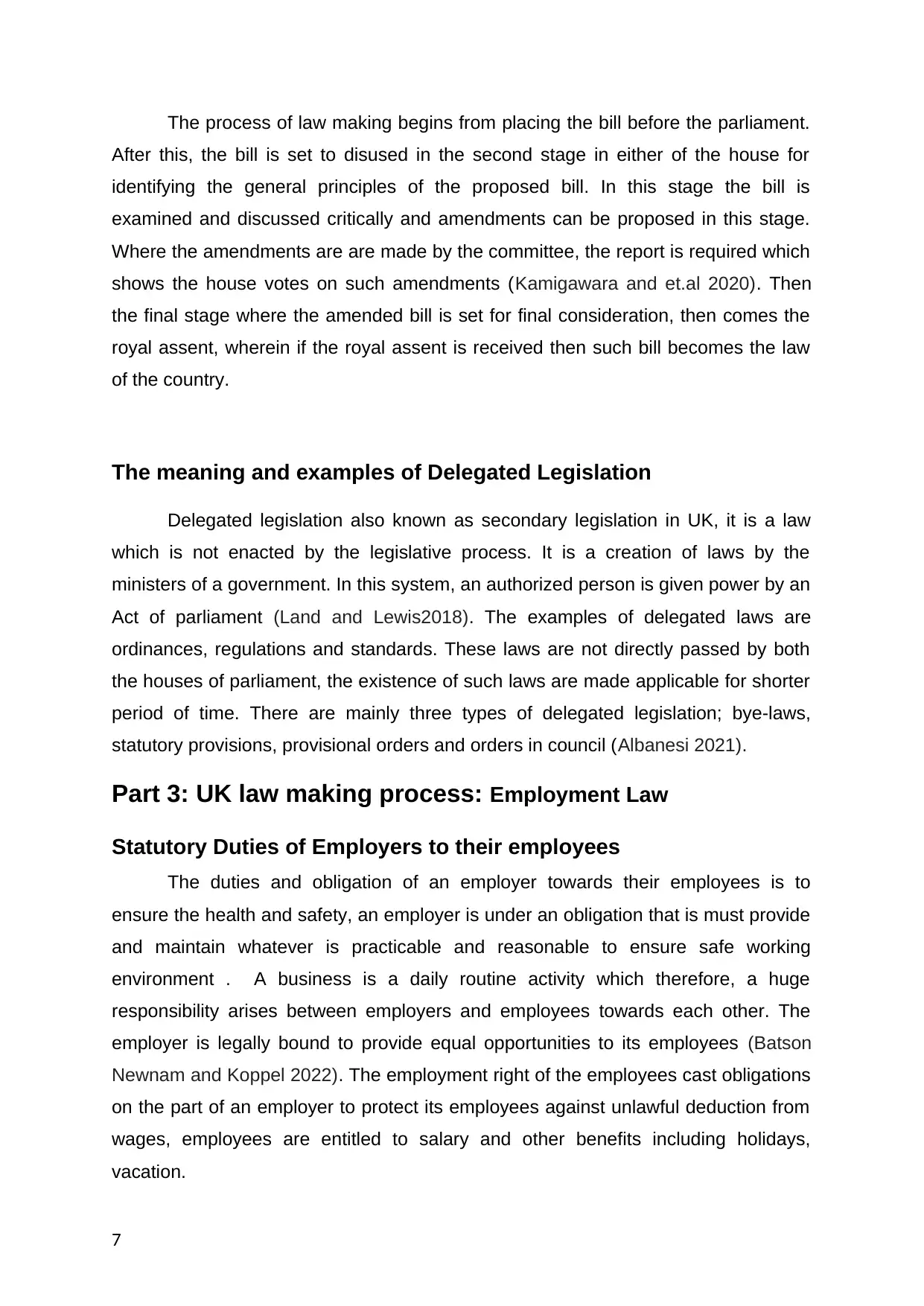
The process of law making begins from placing the bill before the parliament.
After this, the bill is set to disused in the second stage in either of the house for
identifying the general principles of the proposed bill. In this stage the bill is
examined and discussed critically and amendments can be proposed in this stage.
Where the amendments are are made by the committee, the report is required which
shows the house votes on such amendments (Kamigawara and et.al 2020). Then
the final stage where the amended bill is set for final consideration, then comes the
royal assent, wherein if the royal assent is received then such bill becomes the law
of the country.
The meaning and examples of Delegated Legislation
Delegated legislation also known as secondary legislation in UK, it is a law
which is not enacted by the legislative process. It is a creation of laws by the
ministers of a government. In this system, an authorized person is given power by an
Act of parliament (Land and Lewis2018). The examples of delegated laws are
ordinances, regulations and standards. These laws are not directly passed by both
the houses of parliament, the existence of such laws are made applicable for shorter
period of time. There are mainly three types of delegated legislation; bye-laws,
statutory provisions, provisional orders and orders in council (Albanesi 2021).
Part 3: UK law making process: Employment Law
Statutory Duties of Employers to their employees
The duties and obligation of an employer towards their employees is to
ensure the health and safety, an employer is under an obligation that is must provide
and maintain whatever is practicable and reasonable to ensure safe working
environment . A business is a daily routine activity which therefore, a huge
responsibility arises between employers and employees towards each other. The
employer is legally bound to provide equal opportunities to its employees (Batson
Newnam and Koppel 2022). The employment right of the employees cast obligations
on the part of an employer to protect its employees against unlawful deduction from
wages, employees are entitled to salary and other benefits including holidays,
vacation.
7
After this, the bill is set to disused in the second stage in either of the house for
identifying the general principles of the proposed bill. In this stage the bill is
examined and discussed critically and amendments can be proposed in this stage.
Where the amendments are are made by the committee, the report is required which
shows the house votes on such amendments (Kamigawara and et.al 2020). Then
the final stage where the amended bill is set for final consideration, then comes the
royal assent, wherein if the royal assent is received then such bill becomes the law
of the country.
The meaning and examples of Delegated Legislation
Delegated legislation also known as secondary legislation in UK, it is a law
which is not enacted by the legislative process. It is a creation of laws by the
ministers of a government. In this system, an authorized person is given power by an
Act of parliament (Land and Lewis2018). The examples of delegated laws are
ordinances, regulations and standards. These laws are not directly passed by both
the houses of parliament, the existence of such laws are made applicable for shorter
period of time. There are mainly three types of delegated legislation; bye-laws,
statutory provisions, provisional orders and orders in council (Albanesi 2021).
Part 3: UK law making process: Employment Law
Statutory Duties of Employers to their employees
The duties and obligation of an employer towards their employees is to
ensure the health and safety, an employer is under an obligation that is must provide
and maintain whatever is practicable and reasonable to ensure safe working
environment . A business is a daily routine activity which therefore, a huge
responsibility arises between employers and employees towards each other. The
employer is legally bound to provide equal opportunities to its employees (Batson
Newnam and Koppel 2022). The employment right of the employees cast obligations
on the part of an employer to protect its employees against unlawful deduction from
wages, employees are entitled to salary and other benefits including holidays,
vacation.
7
Paraphrase This Document
Need a fresh take? Get an instant paraphrase of this document with our AI Paraphraser
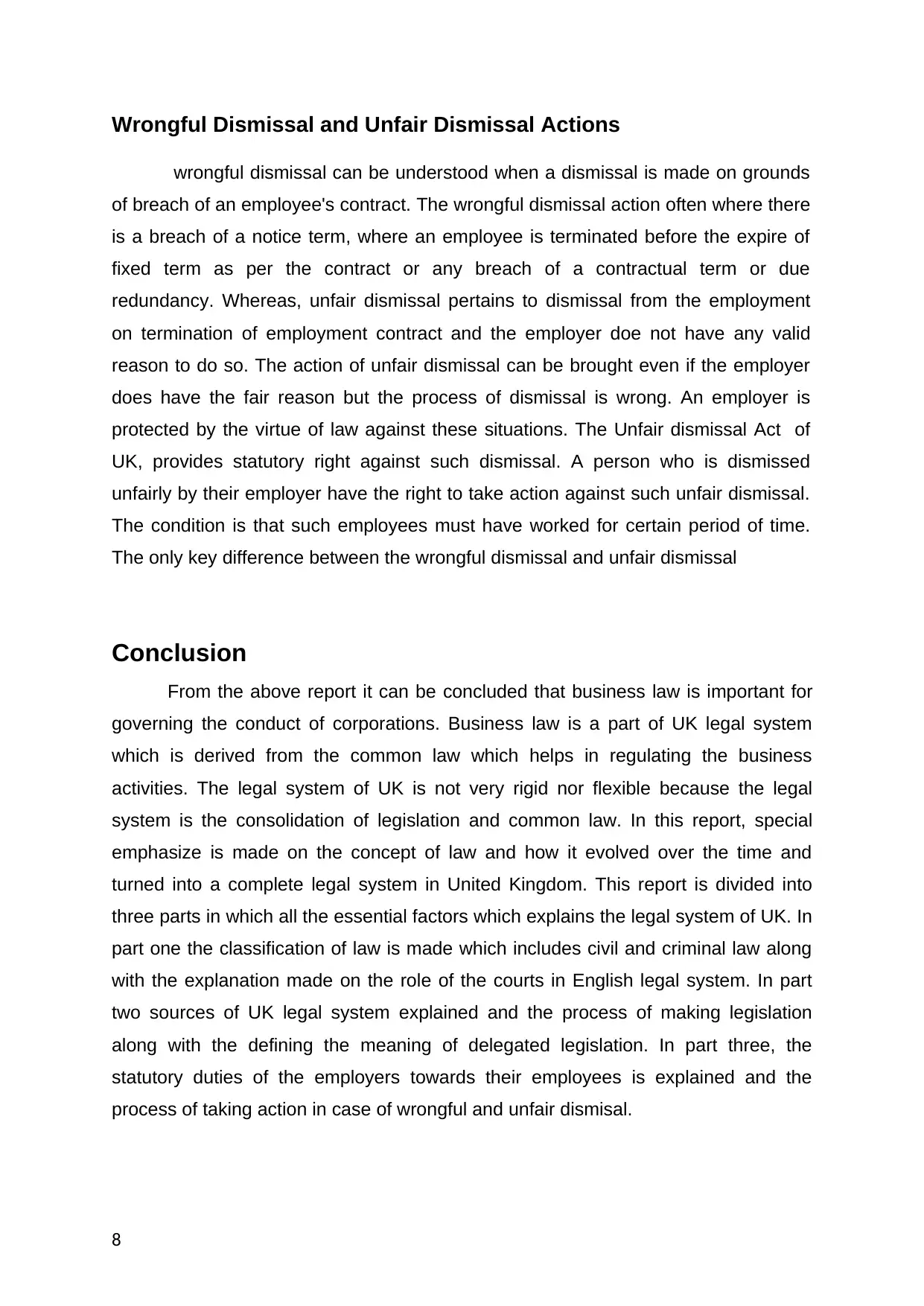
Wrongful Dismissal and Unfair Dismissal Actions
wrongful dismissal can be understood when a dismissal is made on grounds
of breach of an employee's contract. The wrongful dismissal action often where there
is a breach of a notice term, where an employee is terminated before the expire of
fixed term as per the contract or any breach of a contractual term or due
redundancy. Whereas, unfair dismissal pertains to dismissal from the employment
on termination of employment contract and the employer doe not have any valid
reason to do so. The action of unfair dismissal can be brought even if the employer
does have the fair reason but the process of dismissal is wrong. An employer is
protected by the virtue of law against these situations. The Unfair dismissal Act of
UK, provides statutory right against such dismissal. A person who is dismissed
unfairly by their employer have the right to take action against such unfair dismissal.
The condition is that such employees must have worked for certain period of time.
The only key difference between the wrongful dismissal and unfair dismissal
Conclusion
From the above report it can be concluded that business law is important for
governing the conduct of corporations. Business law is a part of UK legal system
which is derived from the common law which helps in regulating the business
activities. The legal system of UK is not very rigid nor flexible because the legal
system is the consolidation of legislation and common law. In this report, special
emphasize is made on the concept of law and how it evolved over the time and
turned into a complete legal system in United Kingdom. This report is divided into
three parts in which all the essential factors which explains the legal system of UK. In
part one the classification of law is made which includes civil and criminal law along
with the explanation made on the role of the courts in English legal system. In part
two sources of UK legal system explained and the process of making legislation
along with the defining the meaning of delegated legislation. In part three, the
statutory duties of the employers towards their employees is explained and the
process of taking action in case of wrongful and unfair dismisal.
8
wrongful dismissal can be understood when a dismissal is made on grounds
of breach of an employee's contract. The wrongful dismissal action often where there
is a breach of a notice term, where an employee is terminated before the expire of
fixed term as per the contract or any breach of a contractual term or due
redundancy. Whereas, unfair dismissal pertains to dismissal from the employment
on termination of employment contract and the employer doe not have any valid
reason to do so. The action of unfair dismissal can be brought even if the employer
does have the fair reason but the process of dismissal is wrong. An employer is
protected by the virtue of law against these situations. The Unfair dismissal Act of
UK, provides statutory right against such dismissal. A person who is dismissed
unfairly by their employer have the right to take action against such unfair dismissal.
The condition is that such employees must have worked for certain period of time.
The only key difference between the wrongful dismissal and unfair dismissal
Conclusion
From the above report it can be concluded that business law is important for
governing the conduct of corporations. Business law is a part of UK legal system
which is derived from the common law which helps in regulating the business
activities. The legal system of UK is not very rigid nor flexible because the legal
system is the consolidation of legislation and common law. In this report, special
emphasize is made on the concept of law and how it evolved over the time and
turned into a complete legal system in United Kingdom. This report is divided into
three parts in which all the essential factors which explains the legal system of UK. In
part one the classification of law is made which includes civil and criminal law along
with the explanation made on the role of the courts in English legal system. In part
two sources of UK legal system explained and the process of making legislation
along with the defining the meaning of delegated legislation. In part three, the
statutory duties of the employers towards their employees is explained and the
process of taking action in case of wrongful and unfair dismisal.
8
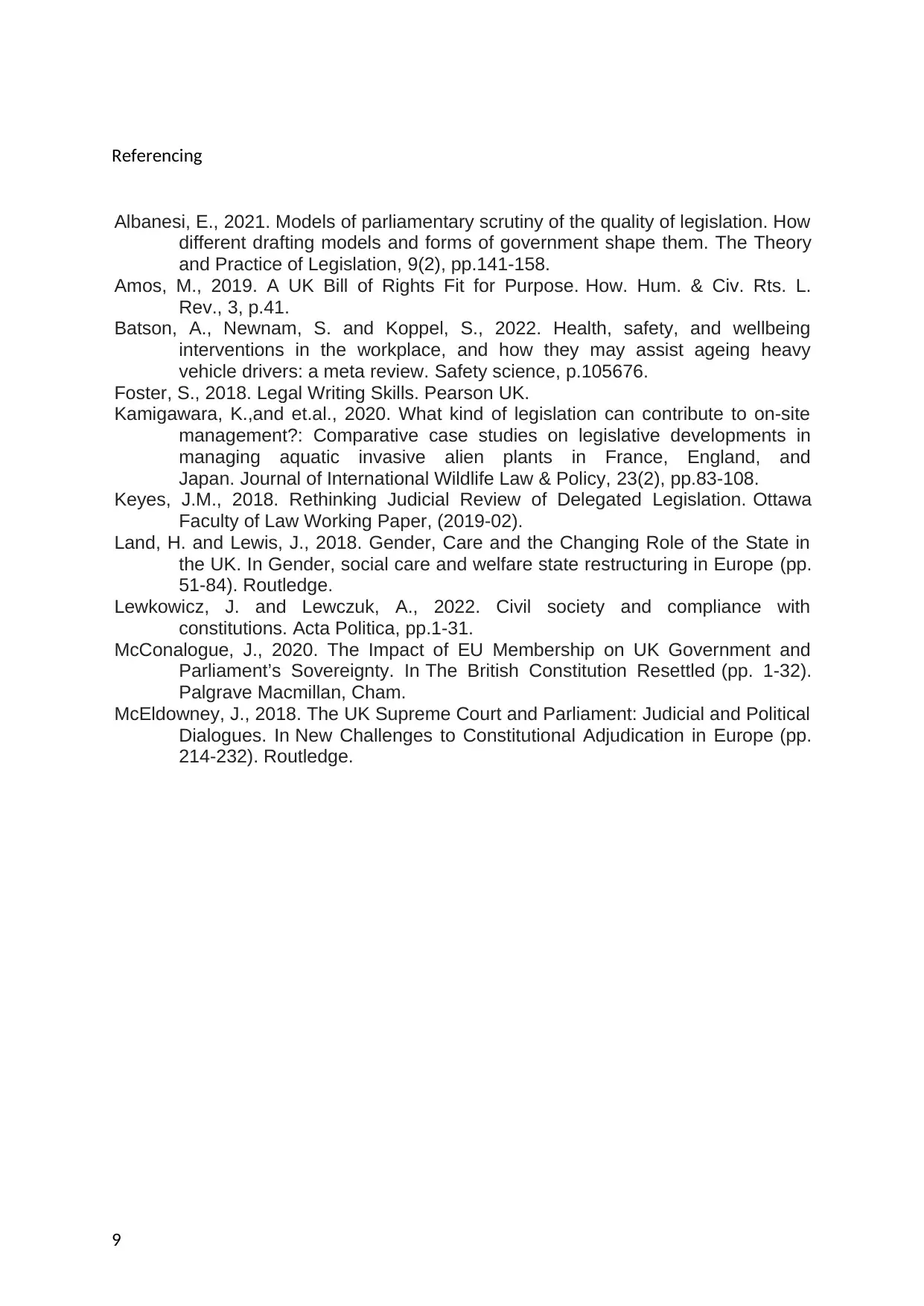
Referencing
Albanesi, E., 2021. Models of parliamentary scrutiny of the quality of legislation. How
different drafting models and forms of government shape them. The Theory
and Practice of Legislation, 9(2), pp.141-158.
Amos, M., 2019. A UK Bill of Rights Fit for Purpose. How. Hum. & Civ. Rts. L.
Rev., 3, p.41.
Batson, A., Newnam, S. and Koppel, S., 2022. Health, safety, and wellbeing
interventions in the workplace, and how they may assist ageing heavy
vehicle drivers: a meta review. Safety science, p.105676.
Foster, S., 2018. Legal Writing Skills. Pearson UK.
Kamigawara, K.,and et.al., 2020. What kind of legislation can contribute to on-site
management?: Comparative case studies on legislative developments in
managing aquatic invasive alien plants in France, England, and
Japan. Journal of International Wildlife Law & Policy, 23(2), pp.83-108.
Keyes, J.M., 2018. Rethinking Judicial Review of Delegated Legislation. Ottawa
Faculty of Law Working Paper, (2019-02).
Land, H. and Lewis, J., 2018. Gender, Care and the Changing Role of the State in
the UK. In Gender, social care and welfare state restructuring in Europe (pp.
51-84). Routledge.
Lewkowicz, J. and Lewczuk, A., 2022. Civil society and compliance with
constitutions. Acta Politica, pp.1-31.
McConalogue, J., 2020. The Impact of EU Membership on UK Government and
Parliament’s Sovereignty. In The British Constitution Resettled (pp. 1-32).
Palgrave Macmillan, Cham.
McEldowney, J., 2018. The UK Supreme Court and Parliament: Judicial and Political
Dialogues. In New Challenges to Constitutional Adjudication in Europe (pp.
214-232). Routledge.
9
Albanesi, E., 2021. Models of parliamentary scrutiny of the quality of legislation. How
different drafting models and forms of government shape them. The Theory
and Practice of Legislation, 9(2), pp.141-158.
Amos, M., 2019. A UK Bill of Rights Fit for Purpose. How. Hum. & Civ. Rts. L.
Rev., 3, p.41.
Batson, A., Newnam, S. and Koppel, S., 2022. Health, safety, and wellbeing
interventions in the workplace, and how they may assist ageing heavy
vehicle drivers: a meta review. Safety science, p.105676.
Foster, S., 2018. Legal Writing Skills. Pearson UK.
Kamigawara, K.,and et.al., 2020. What kind of legislation can contribute to on-site
management?: Comparative case studies on legislative developments in
managing aquatic invasive alien plants in France, England, and
Japan. Journal of International Wildlife Law & Policy, 23(2), pp.83-108.
Keyes, J.M., 2018. Rethinking Judicial Review of Delegated Legislation. Ottawa
Faculty of Law Working Paper, (2019-02).
Land, H. and Lewis, J., 2018. Gender, Care and the Changing Role of the State in
the UK. In Gender, social care and welfare state restructuring in Europe (pp.
51-84). Routledge.
Lewkowicz, J. and Lewczuk, A., 2022. Civil society and compliance with
constitutions. Acta Politica, pp.1-31.
McConalogue, J., 2020. The Impact of EU Membership on UK Government and
Parliament’s Sovereignty. In The British Constitution Resettled (pp. 1-32).
Palgrave Macmillan, Cham.
McEldowney, J., 2018. The UK Supreme Court and Parliament: Judicial and Political
Dialogues. In New Challenges to Constitutional Adjudication in Europe (pp.
214-232). Routledge.
9
⊘ This is a preview!⊘
Do you want full access?
Subscribe today to unlock all pages.

Trusted by 1+ million students worldwide
1 out of 9
Related Documents
Your All-in-One AI-Powered Toolkit for Academic Success.
+13062052269
info@desklib.com
Available 24*7 on WhatsApp / Email
![[object Object]](/_next/static/media/star-bottom.7253800d.svg)
Unlock your academic potential
Copyright © 2020–2026 A2Z Services. All Rights Reserved. Developed and managed by ZUCOL.

